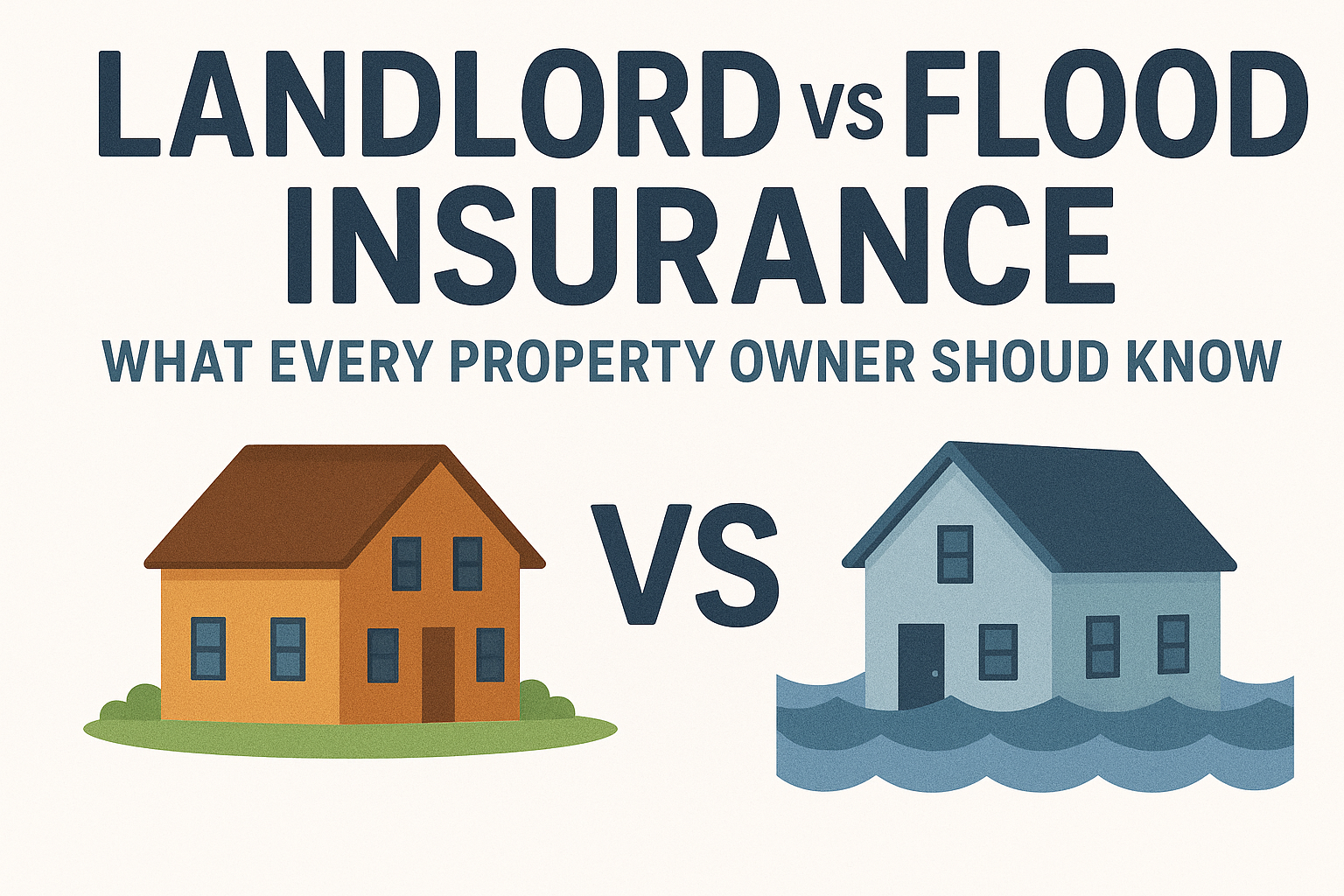When managing rental properties, it’s essential to have the right insurance coverage. Many property owners assume that landlord insurance will cover every possible risk, but flood damage is often excluded. Understanding the difference between landlord vs. flood insurance can save you from costly surprises. Let’s break down what each policy offers, their key differences, and whether you need both.
What Is Landlord Insurance?
Landlord insurance is designed for property owners who rent out their homes, apartments, or other buildings. A standard landlord insurance policy typically includes insurance cover for property damage, loss of rental income, and liability protection if a tenant or visitor gets injured on the property. It’s part of the essential insurance for rental properties toolkit.
What Does Landlord Insurance Cover?
A good landlord policy can help landlords recover from covered events such as fire, wind, or vandalism. It may also cover damage to the building and offer replacement cost for lost income while repairs are made. Some landlord insurance policies also include optional insurance services like legal fees or eviction costs.
What Landlord Insurance Doesn’t Cover
While landlord insurance helps protect your investment, it typically excludes flood damage. That means if your rental property is in a flood zone or special flood hazard area, you’ll need a separate flood insurance policy to fully protect your assets. Standard landlord insurance policies exclude natural disasters like flood and earthquakes, so relying solely on it leaves you vulnerable.
Flood Insurance
What Is Flood Insurance?
Flood insurance is a specialized policy that protects against water damage caused by natural flooding. Unlike standard insurance policies, this coverage is often provided by the National Flood Insurance Program (NFIP) or through private flood insurance carriers. Whether you’re in a high-risk flood zone or not, flood insurance is a critical layer of protection.
Who Needs Flood Insurance for Rental Property?
Flood insurance for rental properties is crucial if your unit is in a flood-prone area. In fact, you may be required to have flood insurance by your lender if your property lies in a special flood hazard zone. Even if you’re outside these zones, flood claims come from low-to-moderate risk areas, so the need is real.
Does FEMA Offer Flood Insurance for Landlords?
Yes, through the NFIP, FEMA provides flood insurance policies to rental property owners. You can purchase a policy through the National Flood program or opt for private flood policies depending on your coverage and budget needs. FEMA’s flood map service center can help determine your flood zone designation.
Key Differences Between Landlord and Flood Insurance
Coverage Scope Comparison
Landlord insurance typically does not cover flood damage. It protects the building from fire, wind, and liability claims, while flood insurance cover kicks in when rising waters damage your building coverage, foundation, or personal property inside. To ensure full coverage for your rental, both policies may be necessary.
Cost Differences
The insurance cost for each policy varies. Flood insurance cost is based on the flood zone, building type, and location. Meanwhile, landlord insurance takes into account the size of the building, its age, and potential liability exposure. While insurance premiums for flood might seem high, the financial hit of not having it is often worse.
Policy Requirements and Limitations
Many mortgage providers require landlord insurance and may also require flood insurance if you’re in a high-risk area. However, standard landlord policies typically exclude flood. If you assume your policy covers flood, a denied claim will prove otherwise. Always confirm whether your policy does not cover specific hazards.
Do You Need Both?
Assessing Your Property’s Flood Risk
Use FEMA’s Flood Map Service Center to determine your flood zone designation. If your rental properties fall into high-risk flood areas, you must purchase flood insurance to avoid gaps in coverage.
When Landlord Insurance Isn’t Enough
Landlord insurance excludes flood and doesn’t offer flood coverage unless specifically added (which is rare). That makes flood insurance to protect your rental income and structure not just smart, but necessary.
Mortgage and Legal Requirements
Many lenders won’t approve financing without both insurance for rental and flood insurance policies. Legal obligations often require landlords to maintain minimum insurance coverage, including flood, especially in special flood hazard areas.
How to Choose the Right Coverage
Tips for Landlords in Flood-Prone Areas
If your property is located in a flood zone, consider adding flood insurance immediately. Check how flood claims come, even from non-coastal or low-risk regions.
Bundling Options or Separate Policies
Some insurance agency providers allow bundling landlord and flood coverage, while others recommend separate flood policies through the NFIP and private flood insurers. Evaluate both for cost and convenience.
Working with Insurance Agents
A knowledgeable insurance agent can guide you through the nuances of flood insurance for landlords and find the right insurance fit. They help you avoid gaps where insurance doesn’t apply and recommend coverage that best suits your rental property insurance needs.
Additional Resources
If you’re unsure about filing after a flood, read our guide on Filing a Claim. Curious how this compares with HOA coverage? Visit HOA Insurance vs Homeowners Insurance or explore different HOA Insurance Types.
Looking to protect an entire apartment building? Learn more about Apartment Building Insurance, or discover what happens in case of fire with Does HOA Cover Fire Insurance. If you’re also managing vehicles for your rental operations, check out our insights on auto insurance.
